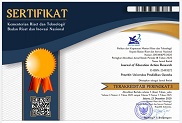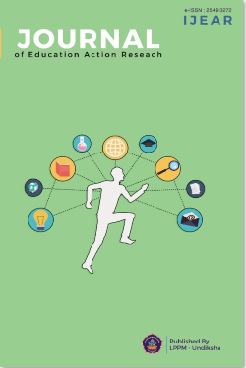Peningkatan Keterampilan Ilmiah Peserta Didik dalam Pembelajaran Fisika Melalui Penerapan Pendekatan STEM dan E-Learning
DOI:
https://doi.org/10.23887/jear.v2i4.16321Abstract
This action research aimed to improve student’s scientific skills through implementation STEM and e-learning in physics learning. This research was conducted from 4 to 26 September 2018 and involving 27 students XI MIPA3 class of SMA Negeri Bali Mandara academic year 2018/2019. This research consist of two learning cycles which each cycle has four stages: planning, action, observation, and reflection. Student’s scientific skills is the score achieved by the student after did some scientific activities in the class and observed by using student’s scientific skills assessment sheet. The result said that the score of each student’s scientific skill exceeded the research success criteria. On first learning cycles, there were 66% of the student’s scientific skill in the excellent category, 33% were in good category, and 11% were in enough category. Moreover, on second learning cycle, there were 44% in excellent category and 56% were in good category. The students also give a positive response to the implementation STEM and e-learning in physics learning.
References
Afriana, Jaka Anna Permanasari, Any Fitriani. 2016. Penerapan Project Based Learning Terintegrasi STEM untuk Meningkatkan Literasi Sains Siswa Ditinjau dari Gender Jurnal Inovasi Pendidikan IPA, 2 (2), 2016 - 203
Berkup, S. B. (2014). Working With Generations X And Y In Generation Z Period: Management Of Different Generations In Business Life. Mediterranean Journal of Social Sciences Vol. 5 No 19.
Butler, J. & Adam. (2018). The Fourth Industrial Revolution and Education. South African Journal of Science Vol. 114 No 5/6.
Chien, P. L. K. & Lajium, D. A. D. (2016). The Effectiveness Of Science, Technology, Engineering and Mathematics (STEM) Learning Approach Among Secondary School Students. Diakses dari https://www.researchgate.net/publication/310651088 pada tanggal 6 Desember 2018.
Evans, D. (2018). Science and Engineering Practices. National Science Teachers Association. Diakses dari https://ngss.nsta.org/PracticesFull.aspx pada tanggal 6 Desember 2018.
Habibi, I. A. (2018). Towards Indonesia 4.0. Dipresentasikan dalam International Symposium on Open, Distance, and e-Learning pada tanggal 3-5 December 2018 di Bali, Indonesia
Han, S., Capraro, R., & Capraro, M. M. 2015. How Science, Technology, Engineering, and Mathematics (STEM) Project-Based Learning (PBL) Affects High, Middle, and Low Achievers Differently: The Impact of Student Factors on Achievement. International Journal of Science and Mathematics Education, Volume 13, Nomor 5.
Ismayani, Ani. 2016. Pengaruh Penerapan Stem Project Based Learning Terhadap Kreativitas Matematis Siswa SMK. Indonesian Digital Journal of Mathematics and Education Volume 3 Nomor 4.
Lestari,Diyah Ayu Budi. 2018. Implementasi Lks Dengan Pendekatan STEM (Science, Technology, Engineering, And Mathematics) Untuk Meningkatkan Kemampuan Berpikir Kritis Siswa. Jurnal Pendidikan Fisika dan Teknologi,Vol 4, No 2.
Liao, Y., Loures, E. R., Deschamp, F., Brezinsky, G., & Venâncio, A. (2018). The Impact of The Fourth Industrial revolution: A Cross-Country/Region Comparison. Production Vol 28 ISSN 1980-5411.
Mayasari, T., Kadorahman, A., & Rusdiana, D. (2014). Pengaruh pembelajaran terintegrasi science, technology, engineering, and mathemathics (STEM) pada hasil belajar peserta didik: Studi meta analisis, Prosiding Semnas Pensa VI “Peran Literasi Sains” (p.371-377). Surabaya: UNESA
Noesgaard S. S. and Ørngreen R. (2015). The Effectiveness of E-Learning: An Explorative and Integrative Review of the Definitions, Methodologies and Factors that Promote e-Learning Effectiveness”. The Electronic Journal of e-Learning Vol. 13 Issue 4. Diakses dari https://www.ejel.com pada tanggal 6 Desember 2018.
Pangesti, K I., D. Yulianti & Sugianto. 2017. Bahan Ajar Berbasiss STEM Untuk Meningkatkan Penguasaan Konsep Siswa SMA. Unnes Physiscs Education Journal. Volume 6, Nomor 3.
Rahmiza, S., Adlim, & Mursal. 2015. Pengembangan LKS STEM (Science, Technology, Engineering, And Mathematics) dalam Meningkatkan Motivasi dan Aktivitas Belajar Siswa SMA NEGERI 1 BEUTONG pada Materi Induksi Elektromagnetik. Jurnal Pendidikan Sains Indonesia. Volume 3, Nomor 1.
Somayeh, M., Dehghani, M., Mozaffari, F., Ghasemnegad, S. M., Hakimi, H., & Samaneh, B. (2016). The effectiveness of E- Learning in Learning: A Review of The Literature. International Journal of Medical Research & Health Sciences Vol. 5 No 2.
Stohlmann, M., Moore, T. J., & Roehrig, G. H. (2012). Considerations for teaching integrated STEM education. Journal of Pre-College Engineering Education Research Journal of Pre-College Engineering Education ResearchJ-PEER) Journal of Pre-











